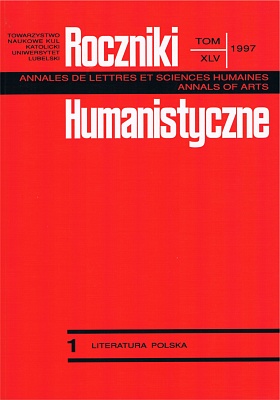Metaphysics and Religion in the Polish Short Story Cycle
Abstract
The short story cycle is a literary genre that has not yet attracted much critical attention. Many texts have not been classified as a cycle, others have not been interpreted thoroughly. The problem therefore offers a wide field to investigation. We conduct our research and interpretative attempts being fully aware of the fact that the limited material we can deal with makes it impossible to draw any generalizations.
The article includes interpretations of short story cycles written at the beginning of the century (Chwile − ᾿Moments᾽ by Orzeszkowa, 1901; Modlitwa Pańska − ᾿Lord's Prayer᾽ by Zapolska, 1904; Zawody − ᾿Professions᾽ by Kaden-Bandrowski, 1911), between the two World Wars (Bezrobotny Lucyfer − ᾿Unemployed Lucifer᾽ by Wat, 1927; Drogi nieuniknione − ᾿Unavoidable Ways᾽ by Andrzejewski, 1936; Sanatorium pod klepsydrą − ᾿The Hourglass Sanatorium᾽ by B. Schulz, 1937), as well as contemporary texts (Zabezpieczanie śladów − ᾿Securing Evidence᾽ by W. Odojewski, 1984; Być i nie być − ᾿To Be and not to Be᾽ by L. Elektorowicz, 1993; Opowieści galicyjskie − ᾿Galician Stories᾽ by A. Stasiuk, 1995). The only conclusion that we can draw with certainty is that the short story cycle constitutes a genre which permits a particularly easy construction of symbolic, and thus metaphysical and religious, meanings.
Copyright (c) 1997 Roczniki Humanistyczne

This work is licensed under a Creative Commons Attribution-NonCommercial-NoDerivatives 4.0 International License.





